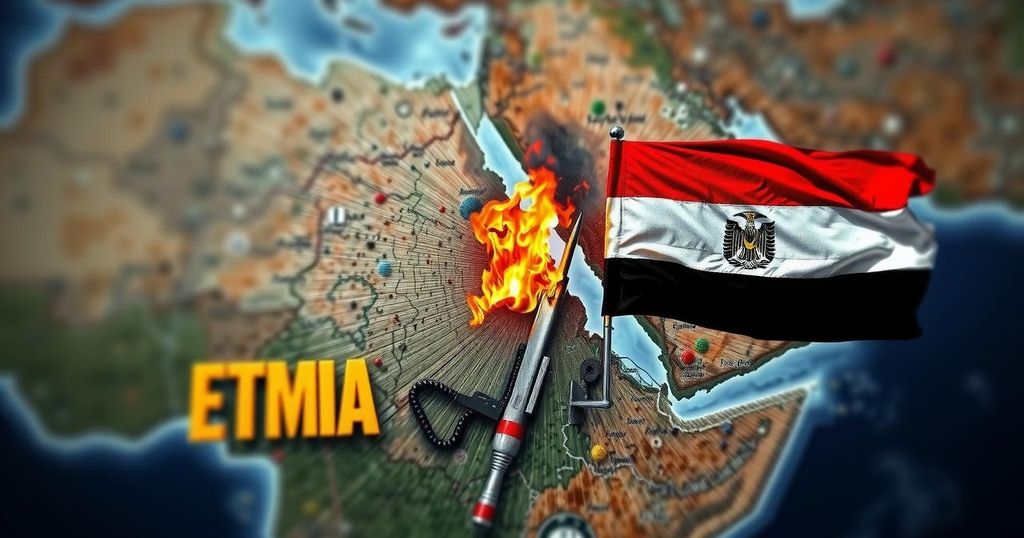Ethiopia’s recent recognition of Somaliland has led to increased tensions with Somalia and a partnership with Egypt, which embarks on military involvement in the region. This creates a complex web of conflict, with the potential for destabilization extending beyond borders if diplomatic resolutions are not sought.
Ethiopia has recently been engaging in negotiations that have further complicated relationships in the Horn of Africa. On January 1, 2024, Ethiopia announced a notable port agreement with Somaliland, leading to its recognition of the breakaway region in exchange for establishing a naval base. This move ignited immediate diplomatic tensions with Somalia, which claims Somaliland as part of its territory and perceives the agreement as an infringement on its sovereignty. In response to the escalating situation involving Ethiopia, Somalia has sought Egypt’s support as a strategic ally to counter Ethiopian expansionism. Egypt, a vociferous opponent of Ethiopia due to the Grand Ethiopian Renaissance Dam—a project that threatens its water security—has shown heightened interest in military collaboration with Somalia. Following a defense accord established with Somalia in August 2024, Egypt has deployed military personnel to the area and will contribute an additional 5,000 soldiers to the African Union Support and Stabilisation Mission in Somalia, set to replace the current mission that features significant Ethiopian participation. Ethiopia’s acknowledgment of Somaliland coincided with its appointment of an ambassador to Hargeisa, marking it as the first country to officially recognize Somaliland’s independence. This development prompted Somaliland to close the Egyptian Cultural Library in its capital, further straining Egypt-Somaliland relations. Additionally, Eritrea, once a central ally for Ethiopia in combating internal dissent, has shifted to align more closely with Egypt and Somalia, posing an increased challenge to Ethiopia’s influence in the region. In the context of Somalia, the emerging dynamics imply potential destabilization as local demands grow for Ethiopia to withdraw its military presence—an outcome that could empower militant groups such as Al-Shabaab. Concerns extend to Djibouti as well, which has expressed apprehension over the economic ramifications of the Ethiopia-Somaliland port deal, notably since Djibouti relies heavily on revenue derived from services to Ethiopia’s shipping needs. The region currently faces multiple crises, including the Ethiopia-Sudan border disputes, instability in Ethiopia itself, and heightened tensions with Eritrea. These factors raise alarm over the potential for proxy conflicts erupting between rival nations, with key areas of concern being the evolving relationships between Sudan and Egypt amidst the Grand Ethiopian Renaissance Dam discourse, and the possibility of proxy warfare against the Ethiopian government backed by Egypt. In light of these complexities, there lies a crucial need for de-escalation. Ethiopia may opt for alternative access to maritime routes that do not necessitate full recognition of Somaliland, potentially alleviating tensions with Somalia. Conversely, Egypt should reevaluate its regional engagement strategies and pursue resolution of the dam-related grievances through international channels such as the United Nations and the African Union. Regional actors are urged to prioritize cooperative approaches to diffuse tensions, ensuring that the consequences of instability do not spill over across their borders.
The article discusses the recent developments in the Horn of Africa, particularly focusing on the strained relationships involving Ethiopia, Somalia, Somaliland, and Egypt. Ethiopia’s recognition of Somaliland in exchange for port access marks a significant geopolitical maneuver that has incited conflict with Somalia. Egypt’s historical rivalry with Ethiopia over water resources has led it to seek closer military ties with Somalia, escalating existing tensions. The article outlines the potential implications for stability in the region amidst ongoing conflicts and the presence of proxy warfare.
The mounting hostilities between Egypt and Ethiopia, coupled with the evolving dynamics in Somalia and Somaliland, highlight the precarious situation in the Horn of Africa. As both countries explore military alliances to bolster their regional stances, the potential for increased conflict looms large. Moreover, the interwoven nature of these geopolitical tensions calls for careful strategic reconsideration by the involved parties to avert further destabilization and ensure regional stability.
Original Source: www.theafricareport.com






